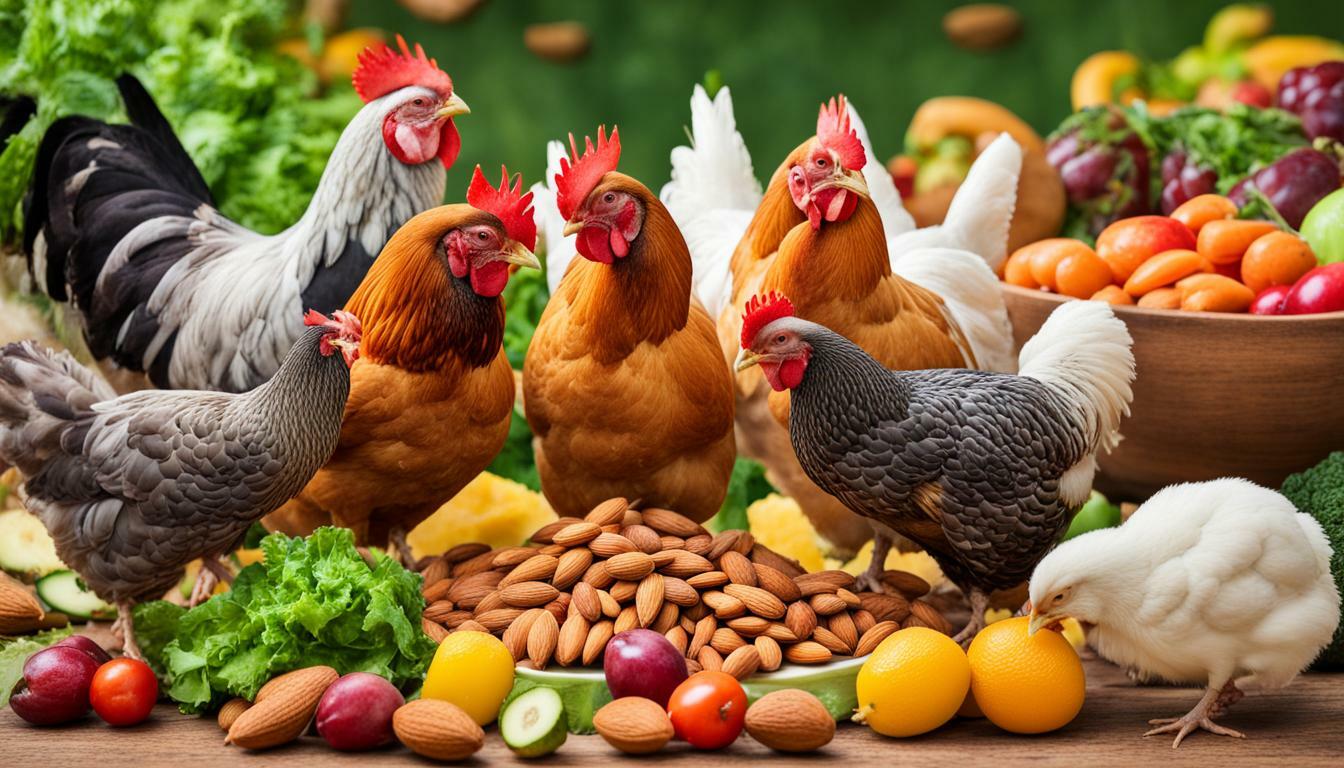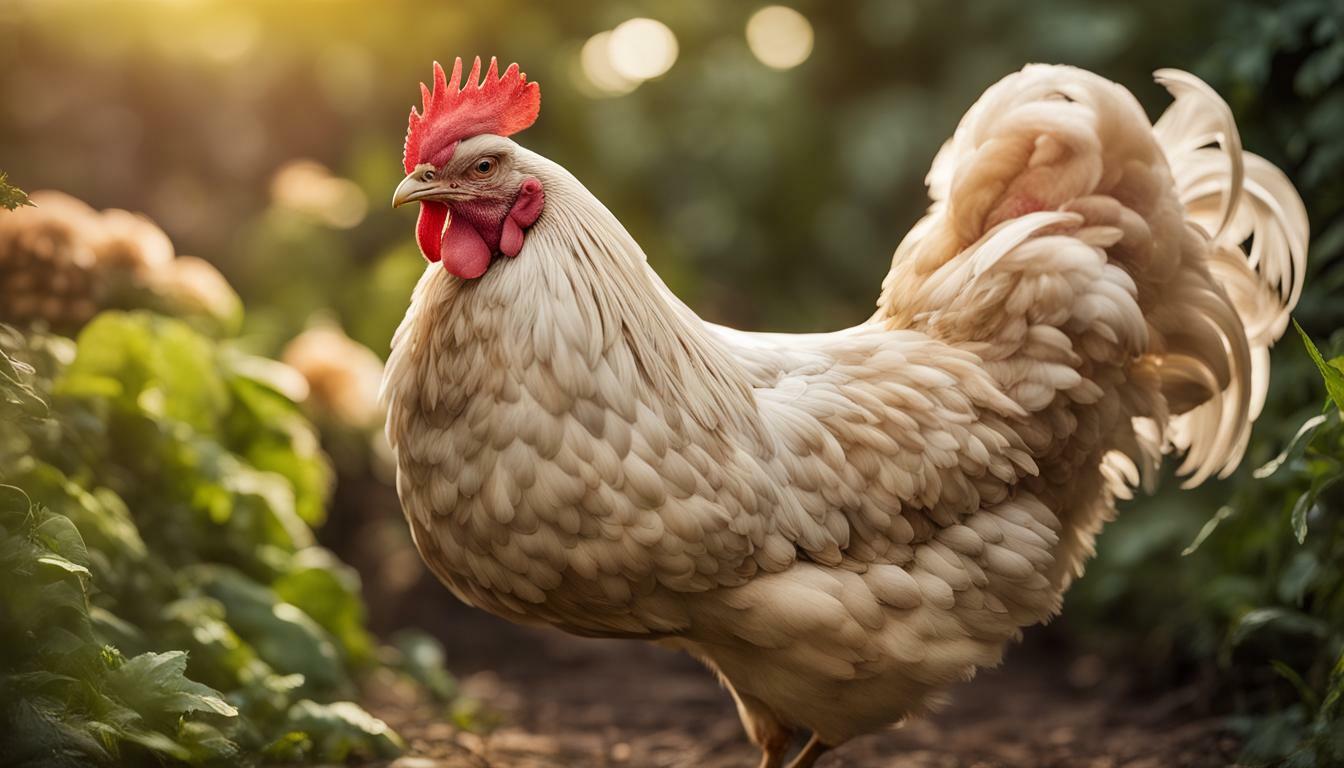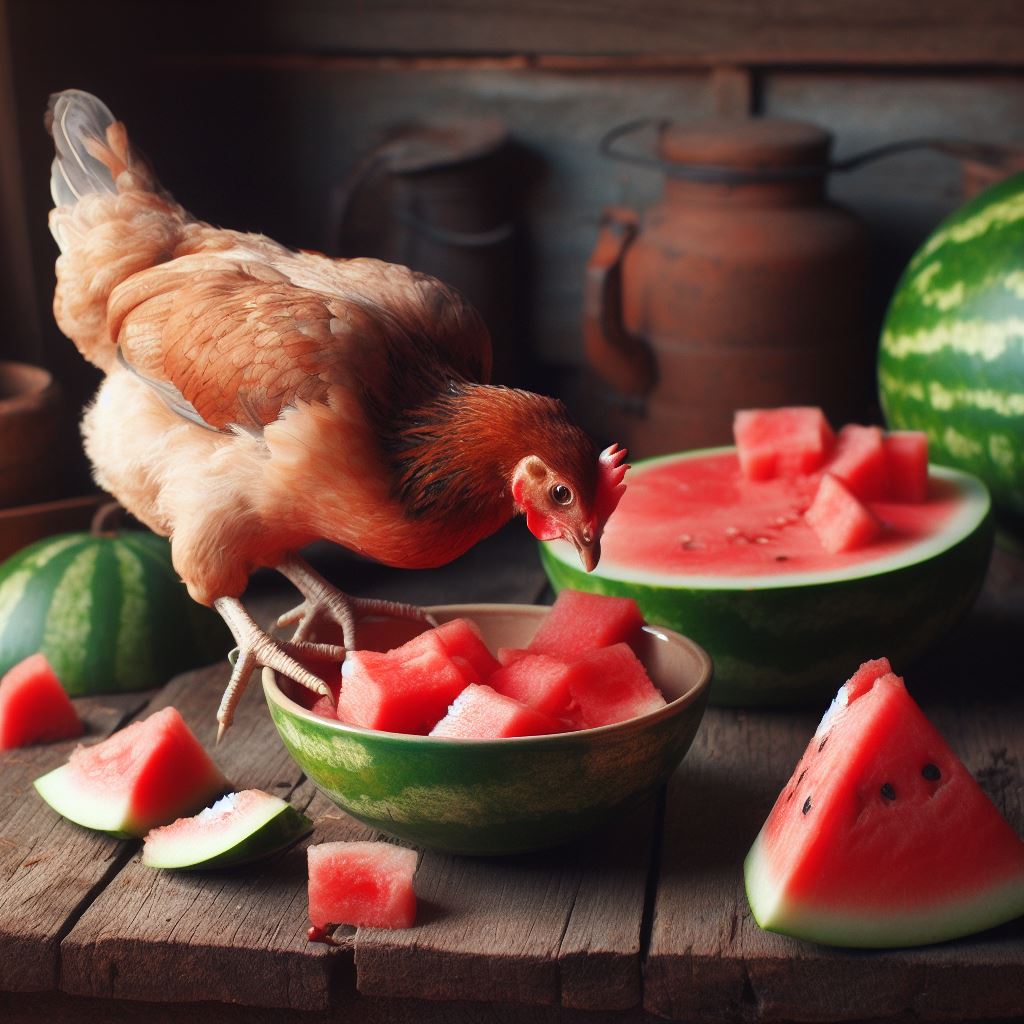Can Chickens Eat Dahlias? Discover the Facts Today!
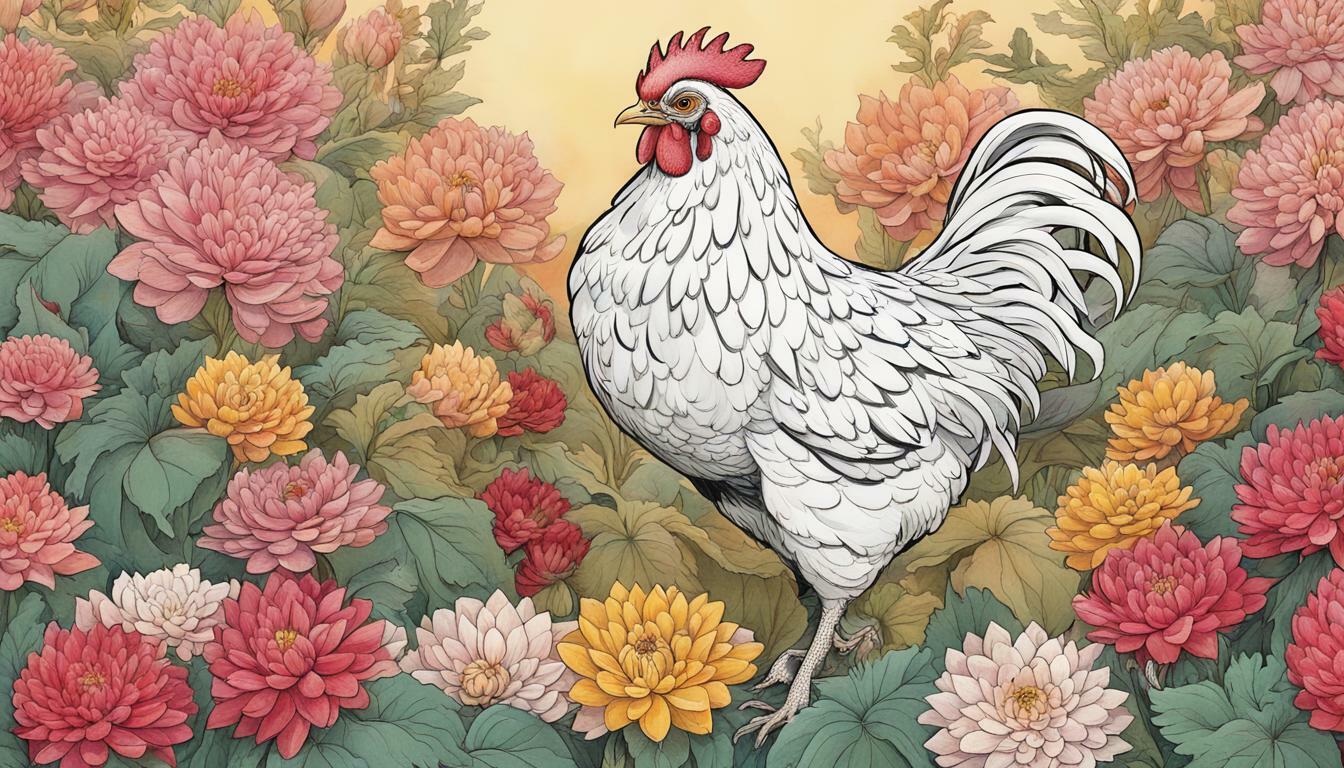
Table of content:
- Are Dahlias Poisonous to Chickens?
- Can Chickens Eat Dahlia Tubers?
- What Do Chickens Eat from Gardens?
- What Flowers Can Chickens Eat?
- Are Marigolds Safe for Chickens?
- What Plants Are Toxic to Chickens?
- What Plants Should Not Be Around Chickens?
- Are Zinnias Safe for Chickens?
- Are Daylilies Poisonous to Chickens?
- Feeding Dahlias to Chickens
- FAQs About Chickens and Dahlias
- Conclusion
Can chickens eat dahlias? The short answer is no, chickens should not eat dahlias. Most parts of the dahlia plant, including the tubers, stems, leaves and flowers contain substances that can be toxic to chickens.
Key Takeaways:
- Dahlias contain substances like oxalates that can be toxic to chickens if consumed in large quantities.
- The tubers, stems and leaves of dahlias can be poisonous, so it’s best to keep chickens away from the plant.
- Chickens may nibble on dahlia flowers, but they don’t provide much nutritional value.
- Dahlias should not be a regular part of a chicken’s diet. Provide chickens with a balanced diet rich in grains, vegetables, fruits, protein and calcium.
- Fence off dahlia gardens and remove excess plant material to prevent chickens from freely eating the plants.
Dahlias are popular tuberous flowering plants that come in a variety of colors and forms. Their showy blooms make them a favorite for gardeners. If you have backyard chickens, you may wonder if these colorful additions to your garden are safe for chickens to eat.
While chickens may nibble on dahlia flowers, they provide little nutritional value. Allowing chickens to freely forage on dahlias can also damage the plants. Dahlias are not recommended as food for backyard chickens.
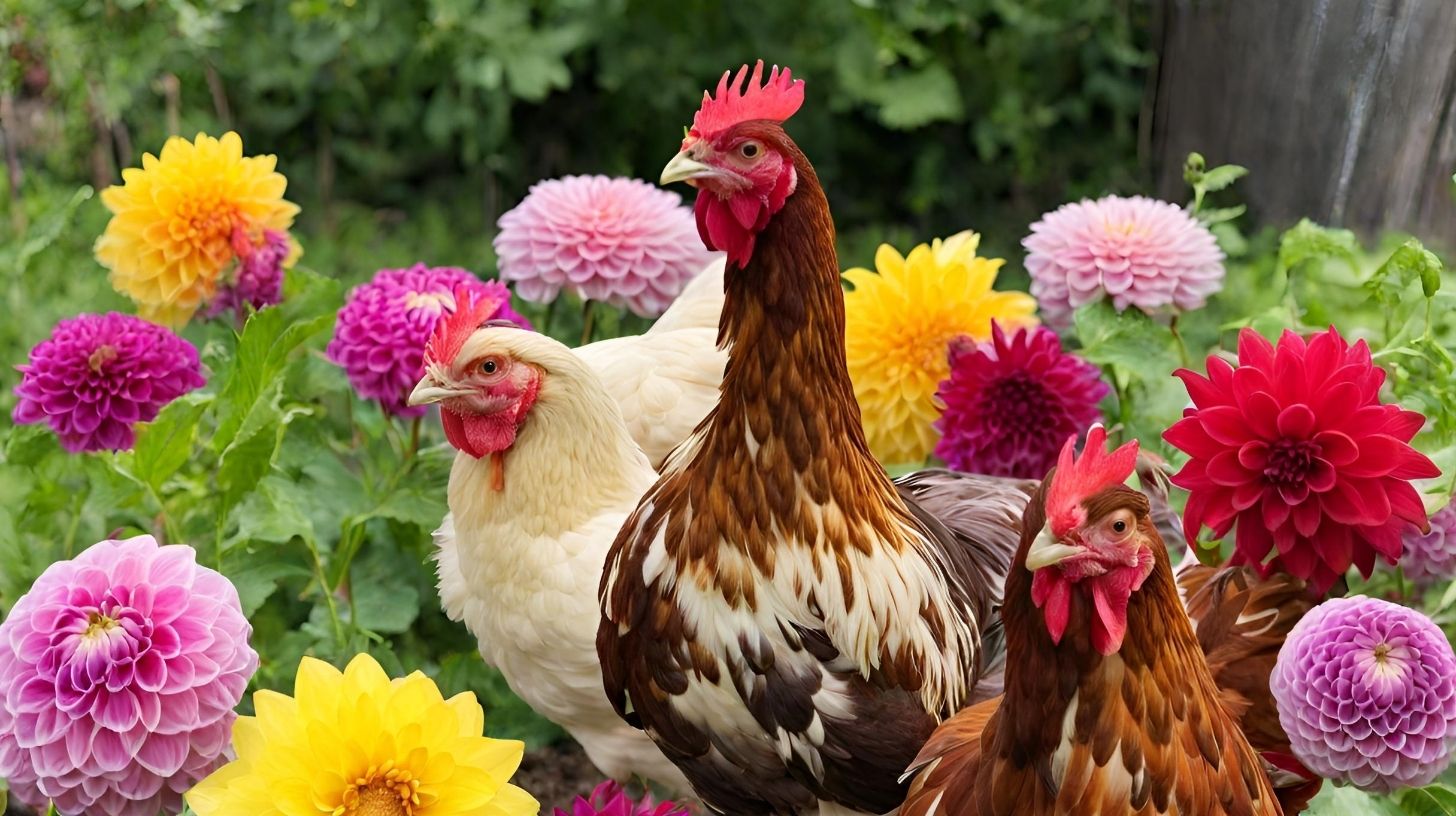 Are Dahlias Poisonous to Chickens?
Are Dahlias Poisonous to Chickens?
Certain parts of the dahlia plant contain compounds that can cause illness if consumed in excess. The biggest concerns are the tubers and stems, which contain higher levels of potentially toxic substances.
Tubers
Dahlia tubers contain inulin and other carbohydrates that chickens cannot properly digest. They also contain oxalates, which can bind to calcium and cause nutritional deficiencies when eaten in large amounts.
Eating dahlia tubers can potentially cause chickens to develop health conditions like:
- Digestive issues
- Kidney problems
- Laying issues
- Increased susceptibility to diseases
- Bone weakness
Stems and Leaves
Dahlia stems and leaves also contain oxalates, though generally not at dangerous levels. These parts may also contain small amounts of toxic compounds found in the tubers.
Flowers
Flowers contain the lowest levels of potentially harmful compounds. Chickens may nibble on dahlia blooms, but they provide minimal nutritional value. Eating a few flowers is unlikely to cause issues.
In small amounts, parts of the dahlia plant are not severely toxic. However, dahlias do not provide enough nutritional benefits to warrant making them a regular part of a chicken’s diet. It’s best to discourage chickens from freely eating the plants.
Can Chickens Eat Dahlia Tubers?
Dahlia tubers should always be considered unsafe for chickens. The tubers contain higher concentrations of oxalates and other substances that can be poisonous to chickens.
Eating even small amounts of tubers increases a chicken’s risk of developing health issues over time. Do not intentionally feed dahlia tubers to chickens.
If chickens dig up and eat tubers from the garden, they may exhibit signs of distress like:
- Decreased appetite
- Increased thirst
- Diarrhea
- Weakness
- Reduced egg laying
Seek veterinary care if chickens display any abnormalities after ingesting dahlia tubers or plants. Prompt treatment increases recovery chances.
What Do Chickens Eat from Gardens?
While dahlias should be off limits, there are plenty of garden fruits, vegetables, herbs and edible flowers that are safe and nutritious for chickens. Some good options include:
Fruits And Vegetables
- Strawberries
- Raspberries
- Apple slices
- Melon
- Tomatoes
- Cucumbers
- Squash
- Broccoli
- Cabbage
- Carrot greens
- Beet greens
Herbs
- Parsley
- Basil
- Mint
- Dill
- Oregano
- Rosemary
Edible Flowers
- Nasturtiums
- Calendula
- Sunflowers
- Roses
- Lavender
- Dandelions
- Marigolds
In moderation, most garden fruits, vegetables and herbs can be fed to chickens fresh or dried. Remove any wilted or rotten produce.
Chickens that forage in gardens should still be fed a balanced diet with commercial feed. Provide grit to aid digestion of plant materials.
What Flowers Can Chickens Eat?
Chickens can safely eat many types of garden flowers. Some nutritional choices include:
- Nasturtiums – Contain carotenoids for coloration; attract aphids.
- Calendula – Rich in antioxidants like lutein; stimulates egg yolk color.
- Roses – Provide bioflavonoids, polyphenols and vitamin C. Remove thorns!
- Sunflowers – High in protein; attract insects.
- Marigolds – Aid digestion and deter parasites; limit intake.
- Lavender – Has soothing properties; fed fresh or dried.
- Dandelions – Leaves and flowers packed with nutrients like vitamin A.
Flowers provide extra antioxidants, minerals and compounds like lutein for richer egg yolks. Feed flower petals in moderation to avoid toxicity issues. Always remove stamens, pistils and other inedible parts.
Introduce new flowers slowly. Discontinue use if chickens show signs of distress.
Are Marigolds Safe for Chickens?
Marigolds are edible flowers that are safe for chickens. Their vibrant orange and yellow blooms can be fed fresh or dried as a nutritional supplement.
Marigolds provide benefits like:
- Carotenoids for egg yolk coloration
- Bioflavonoids and antioxidants
- Compounds that deter parasites
However, marigold leaves and stems contain small amounts of thiophenes that can be toxic in high doses. Avoid allowing chickens to eat large volumes of marigold foliage.
Introduce dried marigold petals slowly. About 1-2 teaspoons per chicken per week is a good starting amount. Monitor for any adverse reactions.
Marigold flowers present low toxicity risks for chickens when fed occasionally in moderation. Their nutritional compounds can help support chicken health.
What Plants Are Toxic to Chickens?
Some common plants found in home gardens and in the wild can be poisonous to chickens. Toxic plants to avoid include:
Flowers And Ornamentals
- Dahlias
- Chrysanthemums
- Foxglove
- Hydrangea
- Iris
- Lilies
Trees And Shrubs
- Cherry trees (wilting leaves & seeds)
- Rhododendron
- Azalea
- Yew
- Oleander
- Sago palm
Vegetables And Herbs
- Raw potatoes (greens are fine)
- Raw tomato leaves
- Raw rhubarb leaves
- Eggplant leaves
To prevent poisoning, remove toxic plants from areas accessible to chickens. Fence off landscaping they could consume. Poultry-safe alternatives include marigolds, sunflowers, roses and nasturtiums.
What Plants Should Not Be Around Chickens?
In addition to directly toxic plants, there are some plants that can be harmful for chickens to be around. Avoid planting these in coops or runs:
- Nightshades – Plants like tomatoes, potatoes and eggplant contain solanine. Leaves and stems are more toxic when damaged or wilting.
- Legumes – Raw green beans, peas, soybeans, lentils, peanuts can contain lectins and other antinutrients. Safe when cooked.
- Onions, garlic, chives – Can cause hemolytic anemia in some birds when eaten in large amounts.
- Seeds/pits – Apple seeds, peach pits and cherries contain cyanide.
It’s also best to keep chickens away from any ornamental plants until you can identify they are non-toxic. Some safe, chicken-friendly plants include sunflowers, marigolds and basil.
Fence off vegetable gardens and avoid throwing garden waste into chicken runs. Remove dropped fruit to prevent chickens from eating toxic seeds.
Are Zinnias Safe for Chickens?
Zinnias are colorful, low-maintenance flowers that make a great addition to a chicken-friendly garden. Both the flowers and leaves of zinnias are edible and safe for chickens.
Zinnia flowers provide nutrients like:
- Niacin
- Vitamin C
- Antioxidants like lutein
The leaves contain compounds that help repel parasites. This makes zinnias a good dual purpose plant for chickens – they can eat the flowers and leaves, and grazing near the plants may deter lice and mites.
To maximize safety:
- Introduce zinnias slowly to watch for adverse effects.
- Feed freshly harvested flowers and leaves, not wilted plants.
- Avoid letting chickens consume large amounts of foliage.
- Fence off growing zinnias to prevent over consumption.
As with any new treat, observe your flock’s reaction to zinnias before offering them regularly. In moderation, these colorful blooms make a nutritious, low-risk supplement for chickens.
Are Daylilies Poisonous to Chickens?
Daylilies are a common perennial flower that can cause toxicity issues if consumed by chickens. All parts of the daylily plant contain insoluble calcium oxalates that can cause poisoning in poultry.
Eating daylily foliage, stems or flowers can lead to issues like:
- Loss of appetite
- Drooling
- Vomiting
- Diarrhea
- Weakness
- Difficulty breathing
Do not feed daylilies to chickens or allow them to freely forage in daylily gardens. Remove and discard any dropped blooms or cut plants. Fence off landscaping areas if needed.
Some safe, chicken-friendly flower alternatives to daylilies include marigolds, nasturtiums, sunflowers and zinnias. These provide more nutritional benefits with lower toxicity risks.
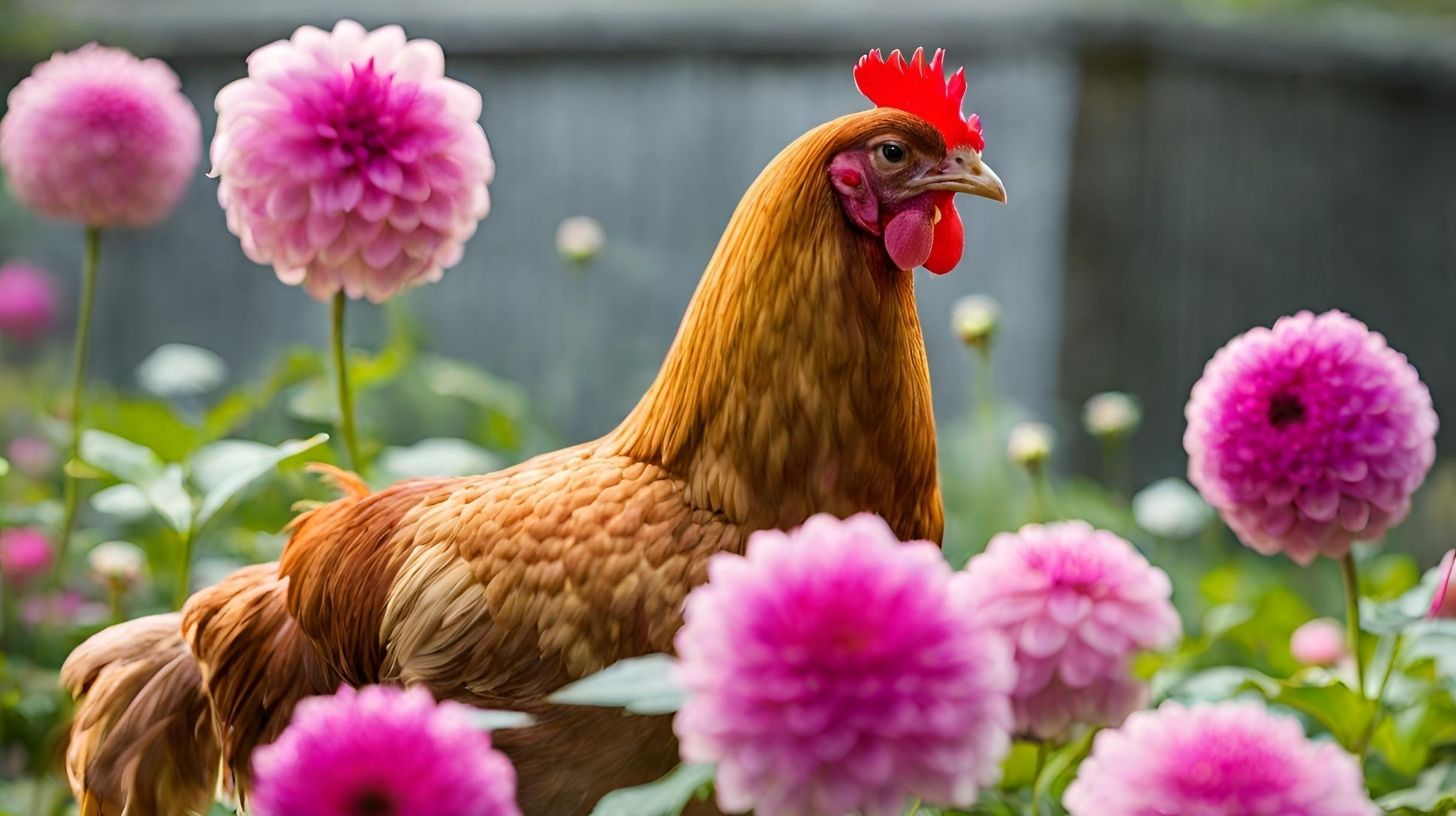 Feeding Dahlias to Chickens
Feeding Dahlias to Chickens
Dahlias are not a recommended food source for chickens due to potential toxicity issues. If chickens eat parts of the dahlia plant, take these precautions:
- Remove excess plant material from yards and coops to limit access.
- Fence off dahlia gardens and border plantings.
- Avoid throwing garden waste into chicken pens.
- Monitor chickens closely if they ingest dahlia plants.
- Seek veterinary help if chickens show signs of distress.
- Provide ample feed and water to dilute any toxins.
Instead of dahlias, offer chickens a variety of poultry-safe fruits, vegetables, herbs and edible flowers for supplemental nutrition. Maintain a balanced diet to support optimal health.
FAQs About Chickens and Dahlias
Can chickens eat dahlia petals?
Dahlia flower petals contain lower levels of potentially harmful compounds compared to other plant parts. It’s unlikely that occasional nibbling on dahlia petals would cause major issues. However, the flowers provide very limited nutritional value and are not recommended as food.
What if my chickens keep eating dahlias?
Take steps to limit chickens’ access to dahlias:
- Remove excess garden debris.
- Install fencing around dahlia plantings.
- Move toxic garden waste out of reach.
- Provide ample alternative forage, like greens, vegetable scraps or edible flowers.
- Consider relocating dahlias away from main chicken areas.
Prevention is key to keep chickens from overconsuming plants that could cause toxicity problems.
Do dahlias attract pests and rodents?
Dahlias do not typically attract many pests that could pose issues for chickens. However, their tubers may draw voles or gophers that dig for food in the garden.
Rodents can spread diseases and parasites. Discourage them by:
- Removing tubers after frost kills dahlia plants.
- Placing plants in wire cages or baskets.
- Using garden fencing designed to deter burrowing animals.
What flowers can I plant for chickens near dahlias?
Some good dahlia companions that are safe for chickens include:
- Marigolds
- Zinnias
- Cosmos
- Nasturtiums
- Calendula
- Sunflowers
Interplant these around dahlias to provide an attractive, chicken-friendly flower garden. Just be sure to fence off dahlias to prevent consumption by chickens.
Conclusion
Dahlias are best kept out of reach from backyard chickens. Their tubers, stems and leaves contain substances like oxalates that can potentially cause toxicity. While small amounts may not be severely harmful, it’s recommended to discourage chickens from freely eating dahlias.
Fence off dahlia plantings, clean up plant debris, and remove tubers in the fall. Offer chickens ample alternative forage like leafy greens, vegetable scraps and edible flowers. Maintain a balanced diet with commercial feed and clean water.
By understanding what is safe vs. unsafe in the garden, you can protect your flock while allowing them to benefit from nutritious fruits, herbs and flowers. With some planning, it’s possible to have a flourishing dahlia garden alongside healthy, happy chickens.
Welcome. I’m Adreena Shanum, the proud owner of this website, and I am incredibly passionate about animals, especially poultry. I founded adreenapets.com as a labor of love, stemming from my desire to share my knowledge and experiences with poultry enthusiasts worldwide.


